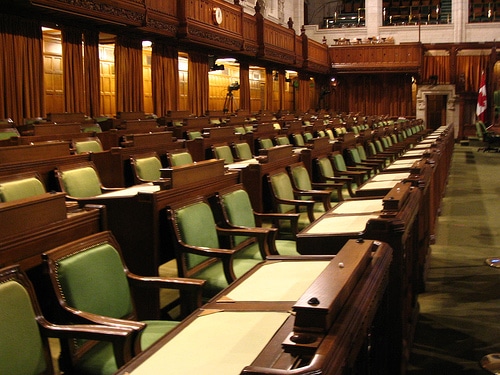Public safety minister Ralph Goodale took to Twitter today (February 27) to announce an impending cannabis amnesty bill.
In a tweet, he says the federal government will soon debate legislation aimed at securing expedited, no-charge pardons for anyone convicted of simple cannabis possession before the federal legalization of weed last year.
Later today, I will give notice to introduce a bill to provide no-cost, expedited pardons for simple possession of cannabis.
— Ralph Goodale (@RalphGoodale) February 27, 2019
The Cannabis Act, Bill C-45, made it legal for Canadians over the legal age of consumption—either 18- or 19-years-old depending on the respective province—to possess up to 30 grams of flower or THC-infused oil. A framework to include more cannabis products, like edibles and topicals, is currently being developed and expected to come into play later this year.
Before October 17, simple possession was punishable with a jail sentence of up to six months and $1,000 fine.
While the exact details won’t be publicized until the bill is formally introduced in the House of Commons, Goodale hinted to some of the party’s intentions on legalization day last year. He said any future legislation in this area would aim to speed up the process—reducing the existing waiting period of at least three years after the completion of a sentence—and eliminate the $631 application fee.
The announcement comes after mounting pressure from cannabis advocates, corporations, and the federal New Democrats, all pushing Ottawa to expunge criminal records of charges for actions now considered legal. On October 3, NDP leader Jagmeet Singh and MP Murray Rankin further stoked the fire when they announced a private member’s bill tabled in the House of Commons calling for the full expungement of possession charges.
Cannabis Amnesty, a non-profit advocacy organization headed by lawyer Annamaria Enanjor, welcomed the announcement on Twitter and said their team is looking forward to reviewing the bill when published.
We look forward to learning more about this proposed bill, and are hopeful that it will finally lessen the strain felt by the 500,000+ Canadians that have a criminal record for something that is longer a crime. #RightingHistorysWrongs https://t.co/XaSlXQUAna
— Cannabis Amnesty (@CannabisAmnesty) February 27, 2019
After Goodale’s announcement, a number of advocates chimed in to further reinforce the need for expungements, suggesting the government’s proposed pardons don’t do enough to repair damage caused by the drug war.
Finally seeing progress on this but still not enough. Pardons are shallow record relief+does not address diminished opportunity faced bc of these charges – cannabis control policy was disproportionate to cannabis use harms, so what will the @liberal_party do about it? #cdnpoli https://t.co/oKVQlG1hU6
— (@jennav5) February 27, 2019
A pardon only sets aside a charge and, while it is removed from police records, an expungement is required to entirely remove the past conviction from an individual’s criminal record.
In accordance with legislative procedure, the first step after tabling notice is to formally introduce the bill in the House of Commons, which requires a notice of 48 hours.
The bill could come as early as Friday, but the House of Commons also breaks for two weeks on the same day, meaning it may not be introduced until the MPs return on March 18.
















